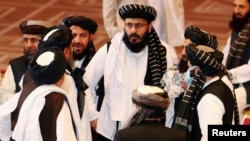Two back-to-back international meetings are being convened in Qatar this week to press Afghanistan’s warring parties to resume peace negotiations and reach a deal before the Afghan conflict spirals out of control.
The diplomatic effort comes amid dramatic battlefield advances by Taliban insurgents even as the United States continues airstrikes in support of embattled Afghan government forces.
It also follows last week’s warning by the United Nations that “the war in Afghanistan has entered a new, deadlier, and more destructive phase.”
The U.S. special representative for Afghanistan, Zalmay Khalilzad, and his counterparts from Russia, China and Pakistan, will meet in the Qatari capital, Doha, on Wednesday under what is officially known as the “extended troika,” diplomatic sources told VOA.
The Moscow-initiated group conducts regular consultations on ways to support intra-Afghan negotiations to help the parties reach a political settlement and a permanent and comprehensive cease-fire.
The extended troika will hold consultations before meeting Doha-based Taliban and Kabul government representatives who are engaged in slow-moving intra-Afghan peace negotiations there, VOA learned from reliable sources at the Pakistani Foreign Ministry.
The extended troika will be preceded by a meeting on Tuesday of Afghanistan’s immediate neighbors. Russia, the United Nations and United States have also been invited to Tuesday’s meeting.
The goal of both discussions will be “to seek a possible common ground” between the two Afghan adversaries “at a time when (the Taliban) have started occupying provincial capitals,” the Foreign Ministry sources said.
Pakistan’s special envoy for Afghanistan, Muhammad Sadiq, and the country’s ambassador to Kabul, Mansoor Khan, will be visiting Doha to attend the Afghan peace-related meetings there, the sources added.
“We are always looking for ways and means to help accelerate the negotiations because we don't see a military solution to the war in Afghanistan,” Khalilzad told VOA last week.
“There must be a political solution, a political agreement for a lasting peace, and we will stay with it. We are committed to staying with it until that goal is achieved,” the U.S. envoy pledged.
The Taliban advances have raised the prospects of the Islamist group’s return to power in Afghanistan.
At its last meeting in April this year, the extended troika had warned the insurgents not to attempt to militarily seize control of the Afghan capital, Kabul.
“We do not support the establishment in Afghanistan of any government imposed by force,” said a joint statement issued at the time.
The peace efforts come as United States troops, under directives by U.S. President Joe Biden, are set to leave Afghanistan, along with its NATO-allied troops, by the end of this month after 20 years.
The withdrawal is a crucial outcome of Washington’s peace-building agreement that the Taliban and United States signed in February 2020 when Donald Trump was U.S. president. But the intra-Afghan negotiations that stemmed from the landmark deal have failed to make any significant progress and are stalled.
“Afghanistan's current crisis and the two warring parties' inability to make peace for the sake of their people is now amounting to a political failure representing a serious risk for the region,” said Torek Farhadi, an ex-Afghan government official and analyst.
“We need to move towards a transitional government acceptable to all parties and garner U.N. guarantees for a 2–3-year period. The meetings in Doha must push for such a solution,” Farhadi said.
The Taliban demand Afghan President Ashraf Ghani’s government step down for peace talks to move forward. Ghani maintains he will not agree to any demand in violation of the country’s constitution.





